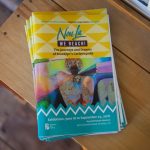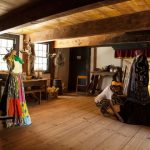Caribbean organization alleges Brooklyn Arts Council misused their intellectual property
 By Jasmine Weber From Hyperallergic
By Jasmine Weber From Hyperallergic
Caribbeing sent a cease and desist to the BAC in July regarding their alleged use of the term “Caribpolitan” in a recent exhibition.
Brooklyn-based organization Caribbeing has voiced concerns over the Brooklyn Arts Council’s alleged use of the company’s term “Caribpolitan,” a term they say is under common law trademark by their organization, in a legal note to the organization, requesting a cease-and-desist for the use of the phrase. Caribbeing raised concerns after the BAC’s incorporation of the term “Caribpolitan,” and “Caribtropolis” in exhibition and social media programming for its current exhibition, Nou La – We Reach! at the Wyckoff House Museum. They have requested the BAC pay a fine for the term’s supposed unauthorized usage with proper public accreditation, or halt all usage within ten days of receiving the letter, dated July 11.
Based in Brooklyn, Caribbeing aims to raise awareness and create programming surrounding urban Caribbean art and culture through exhibitions, workshops, and other efforts. The term “Caribpolitan” expands on popularized phrases like “Afropolitan” to verbalize diasporic experiences and the unique realities of immigrant and second generation culture abroad. Caribbeing defines their iteration of the term on their website:
No longer separated by sea, Caribpolitans bridge the waters by forming new ‘villages’ in diasporic enclaves like Flatbush, Brixton, and Brampton. For most Caribbean immigrants, New York City is their first encounter with neighboring islanders, and the similarities are undeniable. As a united people, Caribpolitans successfully transform and navigate spaces in metropoles while infusing unique Caribbean culture and ethos.
Shelley Worrell, co-founder of Caribbeing, describes the term as a hybrid identity addressing the reality of a person living in “diasporic metropolitan communities” who does not feel entirely circumscribed in either Caribbean or American identities.
In a phone interview, Worrell told Hyperallergic the allegations follow meetings between the two organizations to collaborate on Nou La. She claims after a period of extensive correspondence, the BAC and Caribbeing were unable to come to an agreement regarding payment, and Caribbeing withdrew from the project.
Worrell alleges that following their withdrawal, the BAC continued use of the term “Caribpolitan,” infringing on Caribbeing’s intellectual property. The term is currently under common law trademark, indicating intent to copyright, by Caribbeing. She says, “The site caribpolitan.com has been in use since 2015 and had the ‘TM’ symbol since at least 2016, if not sooner.”
Worrell said in a phone interview, “It’s very important for us [Caribbean-Americans] to have ownership over our intellectual property and storytelling. It is common in the field where a large institution will sweep in and capitalize and monetize on your work … It is imperative that these larger institutions are thoughtful about how they engage with these communities.”
Hyperallergic contacted Brooklyn Arts Council, and the organization declined to speak on the record about the matter, but they communicated that the BAC’s lawyers have responded to the cease and desist. Worrell disputes this claim, telling Hyperallergic her attorney Marina Warner has not received a response from BAC.
Hyperallergic spoke with Desiree Gordon, the curator of Nou La: We Reach!, who says the term “Caribpolitan” was in her vocabulary before she became familiar with Caribbeing’s use of the term. Gordon says the term was an organizing principle in her initial draft of the curatorial concept before she was aware of the possible collaboration and conversations between the BAC and Caribbeing. In this preliminary statement, she defined the term as:
A person, place, or thing that is both Caribbean in origin or heritage as well as urban in setting, position, or scope, inclusive of populations, experiences and products on-island as well as in the diaspora;
a Pan-Caribbean concept, experience or identity that is translingual, transcultural, translocal, and or transnational and through which participants transact in a global cultural market with related social currencies of memory, aspiration, and hybridity.
In 2015, Gordon co-curated a show called “After Afropolitan,” inspired by the widely circulated term “Afropolitan,” which she says was popularized by author Taiye Selasi in her book Ghana Must Go.
In an email to Hyperallergic, Gordon said:
When I developed the conceptual scope of the Nou La We Reach project and made the choice to use the word — in order to align the project with analysis and conversations that had been had around the term “Afropolitan” as inspired by my previous project “After Afropolitan” — I did not know about CaribBEING’s work with the word “Caribpolitan” so it would be false to affirm the idea that the Nou La We Reach project was influenced by or stealing from or transgressing against CaribBEING by using the word. What I would suggest and affirm is that the project exists in a vibrant and plural context which is representative of the Caribbean itself; that the two efforts, existing side by side, are making independent and distinct contributions to pre-existing and ongoing cultural explorations. What I have suggested and will continue to suggest is that it would be more beneficial for all involved for us to create public forums for conversation about our related work than to try to silence each other on false territorial claims.
She says of the term Caribpolitan, “[It’s] a word that was used to tease me … the way people would often poke at immigrant children coming back and forth from the Caribbean.”
Of the conflict over the use of the term, Gordon says, “As a fellow Caribpolitan, what I hope comes out of this is a platform for collaboration and continued conversation.”
In a follow-up email, Gordon said:
The word itself — in truth, not a remarkable things, a bit of a trinket really — is less important than the community I hoped to invoke and the conversation I hoped we’d have about multiple Caribbean experiences with multiple Caribbean brilliants … The word is less important than the community it invokes and I stand by the right and the need for that hybrid polyglot community to have all its stories told as we have already been cautioned against the “danger of one story”, the danger of one voice. The Caribbean is not a monolith and the tools and terms of intellectual and cultural analysis should not be monopolized. We should not look to cannibalise or re-colonize ourselves.
For the exhibition, Gordon interviewed a number of academics, who offered their own definition of “Caribpolitan.” She claims her use of the word comes with a different definition and that these differences host the “potential to create a whole swathe of voices, a whole swathe of experiences … that is what I would offer to this conversation.”
Worrell told Hyperallergic in an email that one of the academics interviewed, Tyesha Maddox, conveyed “that she knew of our use of Caribbeing/Caribpolitan and Little Caribbean. In fact she included Caribbeing and Little Caribbean in the timeline prepared for the project and Caribbeing was later omitted however Little Caribbean was not and also did not cite me nor the organization (Caribbeing) that spearheaded the effort.”
Worrell said in an email to Hyperallergic, regarding the omission of a recognition, “ … the fact that BAC is not taking ownership and responsibility for their actions and work especially given their role in arts and culture in Brooklyn is unacceptable and deplorable.”
The BAC was one of 12 recipients of the 2017 Lincoln Center Cultural Innovation Fund to finance the exhibition, described in the grant announcement as a “a mixed-media, interactive audio/visual timeline, and exhibition that highlights historic moments pivotal to the Caribbean migration to NYC, entirely designed and informed by the vast Caribbean communities that live in Flatbush and Brownsville.” The fund bestows awards between $50,000 and $100,000 to 501(c)(3) public charities servicing the South Bronx or Central Brooklyn that host annual operating budgets over $300,000.
In their letter directed toward BAC executives, the organization stated their allegations:
Most likely due to Caribbeing’s stature in the Brooklyn art world, in April 2017, BAC reached out to Caribbeing to write a letter of support for its Lincoln Center Innovation Fund grant. Upon receipt of the grant, BAC again approached Caribbeing about a potential collaboration. After a series of meetings and email exchanges, the collaboration discussions fell through, largely due to BAC’s budgetary constraints.
On March 19, 2017, Janluk Stanislas, Caribbeing’s Artistic/Creative Director, pointed out that BAC had used the term “Caribtropolis” in connection with its programming, and expressed concern about the similarity of the term with the word “Caribpolitan.” Caribbeing claims his concerns were not addressed by BAC.
On June 15, 2018, Shelley Worrell, Caribbeing’s Executive Director, learned of BAC’s use of the term “Caribpolitan” in connection with its “Nou La!” exhibition, particularly in a video, on social media platforms, and in the curator’s statement. On June 16, Ms. Worrell attended the exhibition, where she also discovered that the term had been used throughout the exhibitions materials, without reference or attribution to Caribbeing.
As Caribbeing has been using the term “Caribpolitan” in connection with arts programming and the aforementioned goods since 2014, Caribbeing has acquired trademark rights in the term. These rights prevent any other entity, including BAC, from using the term “Caribpolitan” in connection with goods or services that compete with Caribbeing’s use. By using the term without a license from Caribbeing, BAC has committed trademark infringement and engaged in unfair competition.
Melissa Branfman, director of the Wycoff House Museum where Nou La was hosted, told Hyperallergic that the museum also wrote a letter of support for the BAC’s grant eligibility. Branfman says the “museum was not involved in the details of the written portion of the exhibition,” and that the museum was not privy to the inclusion of “Caribpolitan” in the exhibition. She says the use of the term was brought to their attention the day of the opening.
As payment for the alleged misuse of the phrase, Caribbeing’s legal team has requested the BAC pay $5,000 to the company. In addition, they are asking for public attribution of Caribbeing as the originator of the term through “posters, brochures, curator’s statement, social media acknowledgment, and the final grant report to the Lincoln Center Innovation Fund.” The July 11 letter requests these demands be met within 10 days of the receipt of the statement, adding, “If BAC cannot agree to these terms, Caribbeing formally requests that BAC immediately cease and desist from ALL USES of the term ‘Caribpolitan’ or any other name or mark that is confusingly similar … ”
Nou La – We Reach! has been extended through October 6. The show was curated by Desiree Gordon.
IMAGES:
A view of the exhibition (© Michael Piña)
Promotional materials for the BAC exhibition (© Michael Piña)
Caribbeing’s founders, Janluk Stanislas and Shelley Worrell (image courtesy of Caribbeing)
For more on this story go to: https://hyperallergic.com/453913/caribbean-organization-alleges-brooklyn-arts-council-misused-their-intellectual-property/







